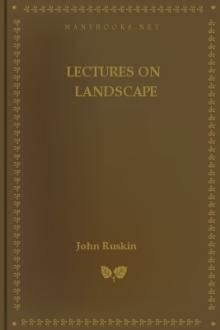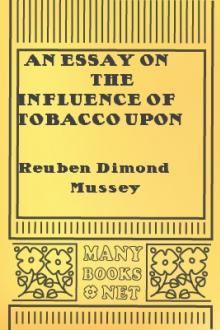Lippincott'S Magazine Of Popular Literature And Science, Volume 26 December, 1880. by Various None (smart ebook reader .txt) 📕

- Author: Various None
Book online «Lippincott'S Magazine Of Popular Literature And Science, Volume 26 December, 1880. by Various None (smart ebook reader .txt) 📕». Author Various None
One Flat, Unless The Atmosphere In The Upper Portions Of The Lower Rooms
Be Shut Off From The Higher, As It Should Be. Another Precaution Which
Might Be Taken With Advantage Is To Use The Higher Shelves For Cloth
Bindings.
"In The Harvard College Library No Gas Has Ever Been Used, Nor Any Other
Artificial Illuminator To Much Extent. Neither Had Any Large Number Of
The Volumes Been Exposed To The Products Of Gas-Combustion, Except For
A Brief Time Before They Were Placed Here. The Bindings In This Library
Showed Very Little Crumbling, But Many Covers Were Breaking At The
Joints From The Shrinking Which Arises From Excessive Dryness. In common
With Many Other Substances, Leather Yields Moisture To The Air Much More
Readily Than It Receives It From That Medium. Cloth Bindings Showed No
Decay At All Here--Very Little In any Of The Libraries, Except In The
Loss Of Color. It Should Be Stated That The Volumes Which I Examined At
Harvard College Were Generally Older Than Those Inspected In The Other
Libraries. There Are Parchment Bindings In each Of The Libraries
Hundreds Of Years Old, Apparently Just As Perfect In Texture As When
First Placed Upon The Shelves Of The Original Owner. The Parchment Was
Often Worn Through At The Angles, But There Was No Breakage From
Shrinking, The Material Having Been Shrunken As Much As Possible When
Prepared From The Skin. At Harvard College I Examined An Embossed Calf
Binding Stretched On Wooden Sides Which Was Above A Hundred Years Old.
It Was In almost Perfect Preservation, And Not Much Shrunken. This
Volume, Being Very Large, Was On A Shelf Next The Ground Floor--A
Position Which It Had Probably Held Ever Since The Erection Of The
Building.
"Professor Nichols Does Not Mention Morocco In His Tables Of Analyses.
Indeed, Morocco Was So Little Used For Bookbindings Until Within About
Thirty Years That It Affords A Less Ample Field For Investigation Than
Any Other Of The Leathers Now In common Use. My Attention Was Therefore
Directed Specially To This Material, Of Which I Found Some Specimens
Having A Record Of Nearly Fifty Years. My Observation Was, That In all
The Libraries These Were Less Affected By Decay, In Proportion To Their
Volume 26 Title 1 (Lippincott'S Magazine Of Popular Literature And Science) Pg 107Age, Than Other Leathers. In Harvard College Library The Best Turkey
Morocco, With Forty Years Of Exposure, Showed No Injury Except From
Chafing. The Outer Integument Was Often Worn Away, Exposing The Texture
Of The Skin, Which Was Still Of Strong Fibre. In The Athenaeum, On The
Contrary, Many Of The Moroccos Showed The Same Decay As The Calf,
Russia And Sheep. There Was, However, A Wide Difference In The Condition
Of Moroccos Of The Same Age--Some Showing As Much Decay As The Calf,
While Others Had Scarcely Any Of The Disintegration Common To The Older
Calf Bindings. The Same Might, Indeed, Be Said Of All Leathers, Those
Tanned By The Quick Modern Methods, With Much More Acid Than Is Used In
Old Processes, In Which Time Is A Large Factor, Showing Always A More
Rapid Deterioration. But, The Methods Being The Same, Morocco, The
Oiliest Of The Common Leathers And The One Having The Firmest Cuticle,
Endures The Best.
"The Order Of Endurance Of Leather (As Observed By Librarians) Against
Atmospheric Effects Is As Follows, Descending From The First To The Last
In Order: Parchment, Light-Colored Morocco, Sheep, Russia, Calf. Cloth
Wears Out Quickly By Use, But Appears--The Linen Especially--To Be
Affected By The Atmosphere Only In Loss Of Color. These Observations All
Refer To The Ordinary Humidity Of The Air In Frequented Rooms.
"This, Then, Is The Result Of My Inquiries: I Found The Shrinking And
Breaking Resulting From Heat Much The Same In all The Libraries, But
Most In That Where The Heating Is From The Outer Air Brought In Over
Hot-Water Pipes, The Two Other Libraries Examined Being Warmed By
Steam-Pipes Having A Higher Temperature. I Found The Mealy Structure--Or
Instead Thereof Flakiness--To Prevail Most In The Athenaeum, Next In The
Public Library: In The Latter, However, Many Volumes Have Been Rebound,
Thus Raising The Average Of Condition. In The Harvard College Library No
Gas--In Fact, Little If Any Artificial Light--Is Used, And Here, Too,
The Mealy Structure And Disintegration Are Mostly Absent. I Conclude,
Therefore, From These Limited Observations, That Heat Is Responsible For
A Large Part Of The Damage To Leather Bindings, Its Effects Being
Evidently Supplemented And Hastened By Gas-Combustion.
"The Ventilating Lamps Before Described, Though Rather Cumbrous To Eyes
Accustomed To The Small And Simple Apparatus Commonly Used, Might Prove
Valuable In Rooms Containing Fabrics Liable; To Be Injured By The Gases
From Open Burners."
As The Chemist Concluded His Reading The Traveller Remarked To The
Somewhat Weary Listeners, "You Now See The Vast Amount Of Study And Care
Required To Use Gas With Economy And Safety. I Could Not Have Argued The
Cause Of A New, Clean, Gasless And Vaporless Light Like Electricity Any
Better Myself."
"At Any Rate," Said The Old Gentleman, "Gas Stock Won'T Go Lower For
Twenty Years Than It Has Been This Winter."
Volume 26 Title 1 (Lippincott'S Magazine Of Popular Literature And Science) Pg 108"You Are All Wedded To Your Idols," Was The Final Protest Of The
Traveller.
"I Wish I Was," Murmured The Young Fellow, With A Side-Glance At His
Fair Neighbor, Who Immediately Removed To Another Part Of The Room.
George J. Varney.
The "_???? ??G?????_ In Shakespeare.
When We Examine The Vocabulary Of Shakespeare, What First Strikes Us Is
Its Copiousness. His Characters Are Countless, And Each One Speaks His
Own Dialect. His Little Fishes Never Talk Like Whales, Nor Do His Whales
Talk Like Little Fishes. Those Curious In Such Matters Have Detected In
His Works Quotations From Seven Foreign Tongues, And Those From Latin
Alone Amount To One Hundred And Thirty-Two.
Our First Impression, That The Shakespearian Variety Of Words Is
Multitudinous, Is Confirmed By Statistics. Mrs. Cowden Clarke Has
Counted Those Words One By One, And Ascertained Their Sum To Be Not Less
Than Fifteen Thousand. The Total Vocabulary Of Milton'S Poetical Remains
Is No More Than Eight Thousand, And That Of Homer, Including The _Hymns_
As Well As Both _Iliad_ And _Odyssey_, Is About Nine Thousand. In The
English Bible The Different Words Are Reckoned By Mr. G.P. Marsh In His
Lectures On The English Language At Rather Fewer Than Six Thousand.
Those In The Greek Testament I Have Learned By Actual Count To Be Not
Far From Five Thousand Five Hundred.
Some German Writers On Greek Grammar Maintain That They Could Teach
Plato And Demosthenes Useful Lessons Concerning Greek Moods And Tenses,
Even As The Ancient Athenians, According To The Fable Of Phaedrus,
Contended That They Understood Squealing Better Than A Pig. However This
May Be, Any One Of Us To-Day, Thanks To The Concordance Of Mrs. Clarke
And The Lexicon Of Alexander Schmidt, May Know Much In Regard To
Shakespeare'S Use Of Language Which Shakespeare Himself Cannot Have
Known. One Particular As To Which He Must Have Been Ignorant, While We
May Have Knowledge, Is Concerning His Employment Of Terms Denominated
_Apa? ?E?? Mue?A_.
The Phrase _Apa? ?E?? Mue?A_--Literally, _Once Spoken_--May Be Traced
Back, I Think, To The Alexandrian Grammarians, Centuries Before Our Era,
Who Invented It To Describe Those Words Which They Observed To Occur
Once, And _Only Once_, In any Author Or Literature. It Is So Convenient
An Expression For Statistical Commentators On The Bible, And On The
Classics As Well, That They Will Not Willingly Let It Die.
The List Of _Apa? ?E?? Mue?A_--That Is, Words Used Once And _Only
Volume 26 Title 1 (Lippincott'S Magazine Of Popular Literature And Science) Pg 109Once_--In Shakespeare Is Surprisingly Long. It Embraces A Greater
Multitude Than Any Man Can Easily Number. Nevertheless, I Have Counted
Those Beginning With Two Letters. The Result Is That The Apa? ?E?? Mue?A
With Initial _A_ Are 364, And Those With Initial _M_ Are 310. There Is
No Reason, That I Know Of, To Suppose The Census With These Initials To
Be Proportionally Larger Than That With Other Letters. If It Is Not,
Then The Words Occurring Only Once In all Shakespeare Cannot Be Less
Than Five Thousand, And They Are Probably A Still Greater Legion.
The Number I Have Culled From One Hundred And Forty-Six Pages Of Schmidt
Is 674. At This Rate The Total On The Fourteen Hundred And Nine Pages Of
The Entire Lexicon Would Foot Up 6504. It Is Possible, Then, That
Shakespeare Discarded, After Once Trying Them, More Different Words Than
Fill And Enrich The Whole English Bible. The Old Grammarians Tell Us
That A Certain Part Of Speech Was Called _Supine_, Because It Was Very
Seldom Needed, And Therefore Almost Always Lying _On Its Back_--I.E.
In Latin, _Supinus_. The Supines Of Shakespeare Outnumber The Employes
Of Most Authors.
The Array Of Shakespearian _Apa? ?E?? Mue?A_ Appears Still Vaster If We
Compare It With Expressions Of The Same Nature In The Scriptures And In
Homer. In The English Bible Words With The Initials _A_ And _M_ Used
Once Only Are 132 To 674 With The Same Initials In Shakespeare. The
Scriptural _Once-Onlys_ Would Be More Than Twice As Many As We Find Them
Were They As Frequent In Proportion To Their Total Vocabulary As His
Are.
The Homeric _Apa? ?E?? Mue?A_ With Initial _M_ Are 78, But Were They As
Numerous In Proportion To Homer'S Whole World Of Words As Shakespeare'S
Are, They Would Run Up To 186; That Is, To More Than Twice As Many As
Their Actual Number.
In The Greek New Testament I Have Enumerated 63 _Apa? ?E?? Mue?A_
Beginning With The Letter _M_--A Larger Number Than You Would Expect,
For It Is As Large As That In both English Testaments Beginning With
That Same Letter, Which Is Also Exactly 63. It Indicates A Wider Range
Of Expression In The Authors Of The Greek Original Than In Their English
Translators.
The 310 Shakespearian Words With Initial _M_ Used _Once Only_ I Have
Also Compared With The Whole Verbal Inventory Of Our Language So Far As
It Begins With That Letter. They Make Up One-Fifth Almost Of That
Entire Stock, Which Musters In Webster Only 1641 Words. You Will At Once
Inquire, "What Is The _Nature_ Of These Rejected Shakespearian Vocables,
Which He Seems To Have Viewed As Milk That Would Bear No More Than One
Skimming?"
The Percentage Of _Classical_ Words Among Them Is Great--Greater Indeed
Than In The Body Of Shakespeare'S Writings. According To The Analysis Of
Weisse, In an Average Hundred Of Shakespearian Words One-Third





Comments (0)